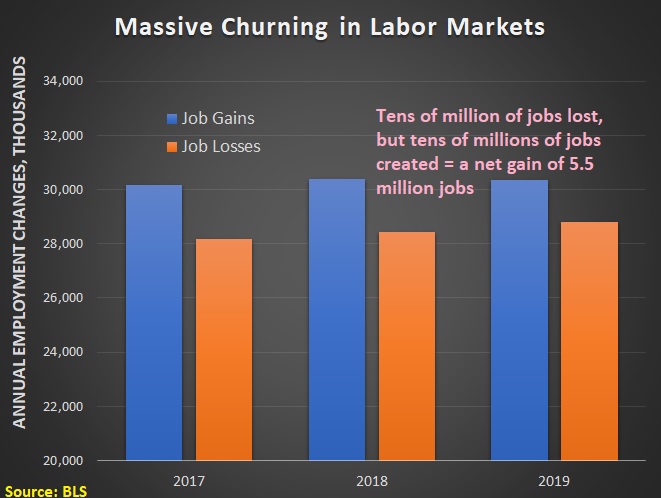I’ve referred to “creative destruction” as the “best and worst part of capitalism.”
This short video from the Fraser Institute is a good tutorial on the topic.
The core message is that entrepreneurs improve our lives by coming up with new ideas, new technologies, and new products.

That’s the good news.
The bad news is that this process unavoidably can have a very negative effect on sectors of the economy that get displaced.
That being said, the bad news for people like blacksmiths and carriage makers hopefully is only temporary since the economy creates other jobs.
This is a point I’ve made when looking at global trade, but the lesson would apply even if the United States was the world’s only nation.
For today’s column, I don’t need to provide any additional analysis. Instead, I’m simply going to share four tweets that illustrate the power of creative destruction.
First, I’ve explained that big companies can get toppled. This tweet shows have fast it can happen.
Mar 1998: "How Yahoo! Won the Search Wars" (Fortune)
— Alec Stapp (@AlecStapp) July 29, 2020
Sep 1998: Google founded
Feb 2004: Facebook founded
Feb 2007: "Will MySpace ever lose its monopoly?" (Guardian)
Jun 2007: iPhone released
Nov 2007: "Nokia. One Billion Customers—Can Anyone Catch the Cell Phone King? (Forbes) pic.twitter.com/uGKcovNSvO
Sticking with the topic of companies, here’s a remarkable tweet capturing the dynamism of the American economy.
Things that didn’t exist on Christmas 20 years ago:
— Jon Erlichman (@JonErlichman) December 25, 2022
iPhone
YouTube
TikTok
Android
Bitcoin
Tesla
iPad
Gmail
Netflix streaming
Amazon Prime
Slack
Etsy
Messenger
Google Maps
Snapchat
Chrome
Zoom
Skype
Spotify
Airbnb
Uber
Next, you don’t need to be my age to remember ubiquitous Blockbuster stores. At one point, there were nearly 6,000 in the country.
But look what happened as new technologies gave consumers better options.
Animated map shows the rise and fall of Blockbuster Video stores in the US from 1986 to 2019. Fascinating to view. Source: https://t.co/WH4fY6ZBxo pic.twitter.com/ivDVVxnZMT
— Simon Kuestenmacher (@simongerman600) June 29, 2020
Now let’s travel back in time. Here’s a job that disappeared because of technological improvements.
knocker-up profession disappeared in 1920s as alarm clocks became cheaper and more reliable pic.twitter.com/UbZDOJxSsA
— Vala Afshar (@ValaAfshar) July 29, 2020
The moral of the story is that the rise and fall of different industries, different companies, and different professions can be messy.
But the long-run result is much higher living standards for families. As I explained in this video, even the children and grandchildren of people who lost their jobs because of creative destruction are much better off.
P.S. Understanding creative destruction also helps to explain why industrial policy is so misguided, along with protectionism. Politicians and special interests are motivated by a desire to save jobs in declining sectors. Instead, they should adopt policies that lower barriers to investment and entrepreneurship. That’s the recipe to hasten the creation of new jobs.

